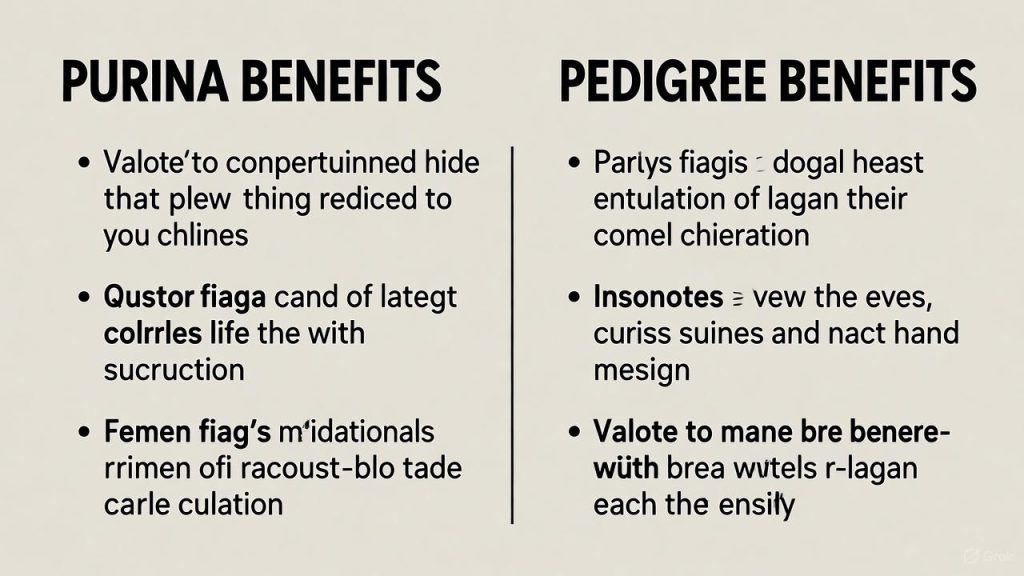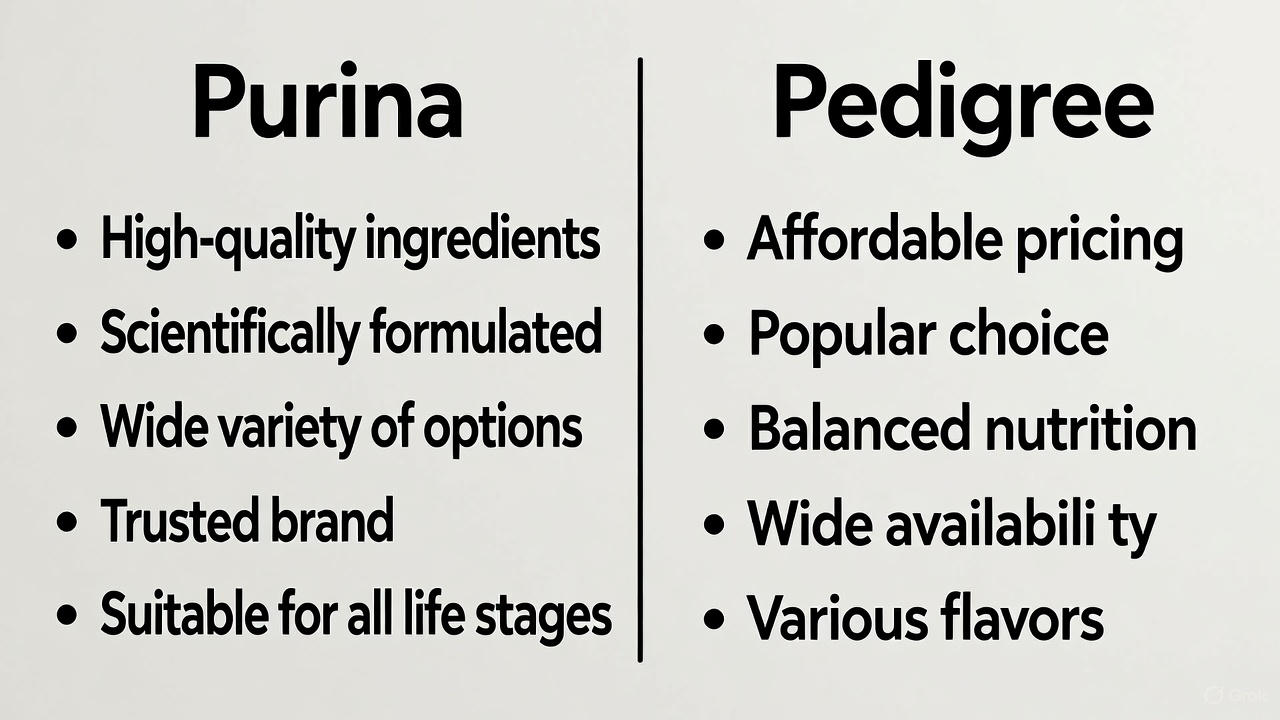Purina vs Pedigree Dog Food?
Your dog depends on you to make the right nutritional choices. With countless dog food brands flooding the market, comparing options becomes essential for responsible pet ownership. Two names that consistently appear in pet store aisles are Purina and Pedigree. Both companies have dominated the dog food industry for decades, yet they offer vastly different products at different price points.
This comprehensive guide breaks down everything you need to know about Purina and Pedigree dog food to help you make an informed decision for your furry companion.
The History Behind These Brands
Purina began operations in 1894 as the Purina Mills Company and has grown into one of the world’s largest pet food manufacturers. The brand operates under Nestlé, the multinational food conglomerate, and produces multiple dog food lines including Pro Plan, Purina ONE, and Purina Dog Chow.
Pedigree entered the pet food market in 1957 and quickly became a household name. Mars, Incorporated owns Pedigree and has positioned the brand as an affordable option for everyday pet owners. The company manufactures a variety of dog food products across different price tiers and nutritional formulas.
Ingredient Quality and Sourcing
When comparing dog foods, ingredient quality matters tremendously. Your dog’s health, energy levels, and longevity depend heavily on what goes into their bowl each day.
Purina sources ingredients from multiple global suppliers and invests significantly in quality control processes. The company operates its own manufacturing facilities and conducts rigorous testing before products reach store shelves. Purina utilizes real meat as the primary ingredient in many of their premium lines, such as Pro Plan and Purina ONE. These formulas contain named meat sources like beef, chicken, or salmon rather than generic “meat meal.”
Pedigree takes a different approach to ingredient sourcing. The brand relies more heavily on grain-based fillers and by-products in their standard product lines. Many Pedigree formulas list “meat and bone meal” or “meat by-products” as primary ingredients rather than whole meat sources. While these ingredients meet AAFCO (Association of American Feed Control Officials) standards, they represent lower-quality protein sources compared to whole meats.
The difference becomes apparent when you read the ingredient labels. Purina Pro Plan and Purina ONE list specific meat types first, followed by healthy grains or grain-free alternatives. Pedigree products often lead with cereals and meat by-products, with added vitamins and minerals to meet nutritional standards.
Nutritional Content and Formulations
Both brands offer multiple product lines designed for different life stages, sizes, and activity levels. The nutritional profiles reveal important distinctions between the two companies.
Purina develops formulas that contain higher protein percentages across their premium range. Pro Plan typically delivers 25-30% crude protein, making it suitable for active dogs and growing puppies. The brand incorporates various specialty ingredients like glucosamine for joint health, omega fatty acids for coat quality, and probiotics for digestive support.
Pedigree formulas generally contain 18-22% crude protein in their standard lines, meeting minimum nutritional requirements but not exceeding them significantly. The lower protein content works for less active dogs but may not support athletic breeds or working dogs adequately. Pedigree does offer higher-protein options in their Performance and Active Dog lines, which provide comparable protein levels to Purina’s standard offerings.
Caloric density varies between the brands as well. Purina typically formulates denser, more nutrient-concentrated kibble, meaning dogs require smaller portions to meet their nutritional needs. Pedigree kibble tends to be less dense, requiring larger serving sizes to deliver the same caloric intake.
Price Points and Value Comparison
Budget constraints influence most pet owners’ purchasing decisions. Pedigree establishes itself as the more affordable option, with prices typically 20-40% lower than Purina products at retail stores. A 30-pound bag of Pedigree might cost between $20-35, while an equivalent Purina Pro Plan bag ranges from $40-60.
However, lower price doesn’t always mean better value. Because Purina’s kibble contains fewer fillers and more concentrated nutrients, you feed smaller portions. A bag of Purina lasts longer than an equivalent-sized Pedigree bag despite the higher upfront cost. When you calculate cost per serving, the price difference narrows considerably.
Purina also runs frequent promotional programs and offers loyalty rewards through their “Purina Pro Club.” These discounts and incentives can reduce the effective price significantly over time. Pedigree provides occasional sales and coupons but less consistently than Purina.
Protein Sources and Digestibility
Protein quality directly impacts your dog’s muscle development, immune function, and overall health. The type and source of protein matter as much as the quantity.
Purina emphasizes named meat sources and animal-based proteins. Products like Pro Plan consistently use chicken, beef, lamb, or fish as primary ingredients. The company also incorporates rice, corn, and other grains or legumes to round out the formula. This combination provides complete amino acid profiles that dogs require for optimal health.
Pedigree relies more heavily on plant-based proteins alongside animal sources. Many formulas include corn gluten meal, soybean meal, and wheat gluten as protein contributors. While these ingredients provide protein, they’re less bioavailable to dogs than animal proteins. Dogs process animal-based proteins more efficiently, absorbing more usable nutrition from each serving.
The digestibility difference manifests in your dog’s stools. Dogs consuming Purina typically produce smaller, more consistent stools because their bodies absorb more of the food. Pedigree-fed dogs often produce larger, looser stools, indicating less efficient nutrient absorption and more waste elimination.

Allergens and Sensitive Stomachs
Many dogs suffer from food sensitivities, allergies, or digestive issues requiring specialized diets. Both Purina and Pedigree address this market but with different approaches.
Purina Pro Plan offers Sensitive Skin & Stomach and Sensitive Skin & Coat formulas with limited ingredient lists. These products remove common allergens like chicken, beef, and grains in favor of novel proteins such as venison or fish. The limited ingredient approach helps identify and eliminate problem foods from your dog’s diet.
Pedigree provides fewer options for dogs with allergies or sensitivities. Their limited ingredient lines remain broader than Purina’s specialized formulas. Dogs with diagnosed food sensitivities generally respond better to Purina’s precision nutrition approach, which specifically targets problematic ingredients.
If your veterinarian has recommended a limited ingredient diet, Purina offers more focused solutions. Pedigree might work for mild digestive concerns but falls short for serious allergies.
Research, Testing, and Safety Records
Both companies maintain good safety records overall, but their testing and research investments differ substantially.
Purina operates dedicated research facilities and collaborates with veterinary universities across the nation. The company invests heavily in studying dog nutrition, conducting feeding trials, and validating product claims. Purina employs nutritionists and veterinarians who continuously improve formulations based on the latest research.
Pedigree maintains quality control standards and conducts safety testing but invests less in nutrition research and innovation. The brand releases new products and formulations less frequently than Purina, suggesting a more conservative approach to product development.
The FDA has issued recalls affecting both companies over the years, though recalls remain relatively rare. Neither brand emerges as significantly safer than the other based on historical data.
Real-World Performance and Customer Experiences
Pet owners consistently report different experiences with these two brands based on their dogs’ individual responses.
Dogs eating Purina products often show improvements in coat quality, energy levels, and overall appearance within two to four weeks. Pet owners note shinier coats, healthier skin, and consistent weight maintenance. Many report that their veterinarians specifically recommend Purina products based on nutritional quality and digestibility.
Pedigree users report satisfactory results for most dogs without serious health issues. Dogs maintain adequate nutrition and general health, though owners often don’t notice dramatic improvements in coat quality or energy compared to other brands. Some pet owners report their dogs perform better on higher-quality alternatives, particularly for coat condition and digestive health.
Dogs with sensitive stomachs frequently transition successfully from Pedigree to Purina with notable digestive improvements. This real-world feedback suggests that many dogs digest Purina more effectively than Pedigree.
Specialized Product Lines
Purina divides their offerings into distinct categories: Purina Dog Chow (budget-friendly), Purina ONE (premium), Pro Plan (professional-grade), and specialized lines for veterinary diets. This segmentation allows customers to choose based on budget while maintaining quality standards.
Pedigree primarily offers two tiers: Pedigree (standard) and Pedigree Pro (enhanced). This simpler structure makes Pedigree easier to navigate for casual shoppers but provides fewer specialized options for specific health needs.
Making Your Decision
Both Purina and Pedigree produce nutritionally adequate dog foods that meet AAFCO standards. Your choice depends on your priorities, budget, and your dog’s individual needs.
Choose Purina if your dog has sensitive digestion, requires higher protein, or needs a specialized formula for allergies. Purina’s ingredient quality, nutritional density, and research backing justify the higher price point for dogs requiring premium nutrition.
Choose Pedigree if budget constraints take priority and your dog thrives on its current diet without digestive issues or allergies. Pedigree provides adequate nutrition at an affordable price, making it suitable for healthy dogs without special needs.
Consider consulting your veterinarian about the best option for your specific dog. Your vet understands your dog’s health history, breed predispositions, and individual requirements better than any online guide.
The Bottom Line
Purina and Pedigree occupy different market positions in the dog food industry. Purina emphasizes quality ingredients, advanced nutrition science, and specialized formulas for specific health needs. Pedigree provides basic, affordable nutrition that meets regulatory standards without premium features.
Neither brand is inherently bad, but they serve different customer bases. Dogs with picky stomachs, allergies, or owners prioritizing top-tier nutrition benefit from Purina’s investment in quality and research. Budget-conscious owners with healthy dogs tolerating standard kibble find excellent value in Pedigree.
The most important factor remains that your dog receives consistent, nutritionally balanced meals. Whether you choose Purina or Pedigree, ensure your dog maintains a healthy weight, has a glossy coat, shows good energy levels, and produces consistent stools. These indicators tell you whether your chosen food actually works for your individual pet.
Start with one option, monitor your dog’s response over several weeks, and adjust accordingly. Your veterinarian stands as your best resource for personalized recommendations based on your dog’s unique health profile and needs.







